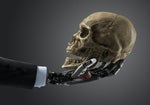ServiceNow embeds AI-powered customer-assist features throughout products

Workflow management software provider ServiceNow has embedded a chatbot for assisting customers with most of its products.
ServiceNow’s new Now Assist tool is an expansion to its AI-powered Now Platform, and is available in its Vancouver software release for IT Service Management (ITSM), Customer Service Management (CSM), HR Service Delivery (HRSD), and Creator workflow application.





